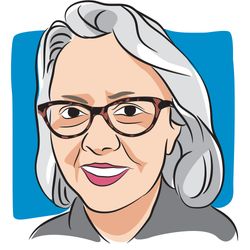- About Us
- Advertise / Support
- Editorial Board
- Contact Us
- CancerNetwork.com
- TargetedOnc.com
- OncLive.com
- OncNursingNews.com
- Terms & Conditions
- Privacy
- Do Not Sell My Information
© 2025 MJH Life Sciences™ and CURE - Oncology & Cancer News for Patients & Caregivers. All rights reserved.
How COVID-19 Affected Getting My Cancer Diagnosis

Donna Short is a corporate executive at MJH Life Sciences, CURE's parent company. In her role, she works with partners and thought leaders in the oncology space. She was diagnosed with breast cancer in April 2020, amidst the COVID-19 pandemic.
A newly diagnosed patient talks about her experience of being diagnosed with breast cancer amidst the COVID-19 pandemic.
COVID-19 resulted in me wearing a mask
I was already wearing a mask for necessary outings to the grocery store. So, wearing a mask to get my follow-up mammogram was not unusual at that point. And once I had disrobed there was a sense of comfort in having it on, like I was more hidden. Maybe I was fooling myself, like the hippo in “Fantasia” that hides himself behind the tree — like we couldn’t see him. But nonetheless, there was something weirdly comforting about having it on and all the people examining and poking on me having one on as well.
COVID-19 resulted in my first visit being by telehealth
My first visit with my surgeon was a telehealth meeting. I had my administrative assistant reach out to the surgeon whom I knew through work. I told her to tell the surgeon I needed to cover a little business and a little personal. The surgeon offered to do it through the Zoom account she used for telehealth. It was great, easy to access and I could hear and see her clearly. We did a little business which I did need to do and then I told her about my diagnosis and everything that I knew about it. She shared her concern and was even empathetic. All of this was much better communicated than I would have thought. She quickly helped me figure out whether my “live” visit would be with my medical oncologist or herself. We discussed the potential paths this might take and decided that my next visit with her would be virtual and the next visit with my medical oncologist would be in person. We determined he was closer in distance and located at a relatively sheltered site only seeing cancer patients without any family attending the visit.
I went to visit my medical oncologist and while I was in the examination room, the surgeon called my phone the Facetime. She decided to move my telehealth appointment up so she could participate in my visit with the medical oncologist. We propped her up on the counter so she could share in the discussions. My medical oncologist even turned her away when he left the room for me to disrobe. I found that pretty funny! Like she isn’t going to see more of me later! I joked with her about this while I was changing clothes. The medical oncologist examined me physically and when noting the bruising from the ultrasound wand or from the biopsy site he would grab my phone and hold it up to the site on my body and say to the surgeon, “Do you see?”. They were so collaborative, even in the physical exam, with one being present virtually.
I can envision this version of telehealth being used for patients. Even initial visits being held by telehealth and being received well by the patients are a possibility. I know many physicians need a physical exam that requires palpations and touch, but being able to go at my cancer as a team I found quite unique and helped me hear them both as they discussed the possibilities with me. I felt included in the plan on my cancer.
COVID-19 meant I wanted to give blood
This was the one change that caught me off guard. When COVID-19 began surging in the Northeast, my company began searching for ways to help employees feel like they were helping others whether raising money for pandemic efforts or meals for front-line workers. One of the events they proposed was a #sleevesup event with the American Red Cross to give blood. We all went online to schedule a time to give blood nearby. My company is in New Jersey and I am in Connecticut. The closest event near me was in May so I went ahead and scheduled the appointment for then, but this was back in mid-March. Then my diagnosis came in April and as I begin therapy, I suddenly found myself unable to give back. That made me very sad. I like to help, or “feel” like I am helping, and it was the first time I felt like this diagnosis was taking something away from me.
One of my friends told me as a point of encouragement that I was going to kick this bully in the ass. Yes, I will and yes, I did feel suddenly bullied.
Remember to #GetSmushed
Related Content:



